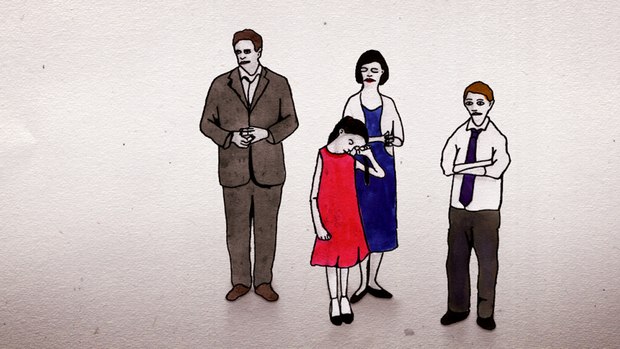Every Tuesday, Chris Robinson digests and dissects (relatively) new indie animation short films. This week's short is Joseph Pierce's dark comedy, A Family Portrait (2010)
French film egghead, Jean-Luc Godard wasn’t talking about family portraits when he said, “not a just image, just an image,” but he might as well have been.
As a kid, our family never had a family portrait taken. I didn’t really think about that until I was older. I figured it was fitting given the tempestuous marriage my mother and stepfather had. That said, I’ve never been comfortable posing for pictures. No, it’s not that 'losing my soul' issue… it just feels false…” Smile” I get told a lot. “Fuck you,” I respond a lot. I can’t just turn on a fucking smile.
The family portrait seems false and desperate: “If we get a photo of us, we will look happy, content and unified. It will hush the screaming doubts. It will reassure the children we are fit, we are love.”
Years ago as a lark, my first wife and I decided to get a family portrait. We were never a traditional family and laughed at the idea of a family portrait, but a neighbour was a photographer and we needed a gift for grandma. Why not get a family portrait done? It will be funny, cheesy and perfect. Christmas came. Grandma was pleased with the gift and proudly displayed it on a living room tabletop.
Two days later I found a lump in my testicle.
One month later I was told I had cancer.
Nine months later I was living alone.
Nothing was ever the same again after we took the family portrait.
-
For a few years after, my ex- mother-in-law displayed the portrait on a table? I’d see it during holiday dinners. I wasn’t sure why she kept it up (it’s down now). Maybe for the kids… but it stung to see it. I saw the picture as symbol of failure…of letting people down.
Plus… there’s something false about that photo. It doesn’t look right. The photographer clearly photoshopped parts of different images to make it work… to make it look natural… and we are all genuinely smiling but there’s a look of discomfort in all of us as though we’re actors, we’re trying to present an image that isn’t entirely us.
It’s not us, yet it’s no one else.
“That’s almost the way we were,” to paraphrase Roland Barthes.








